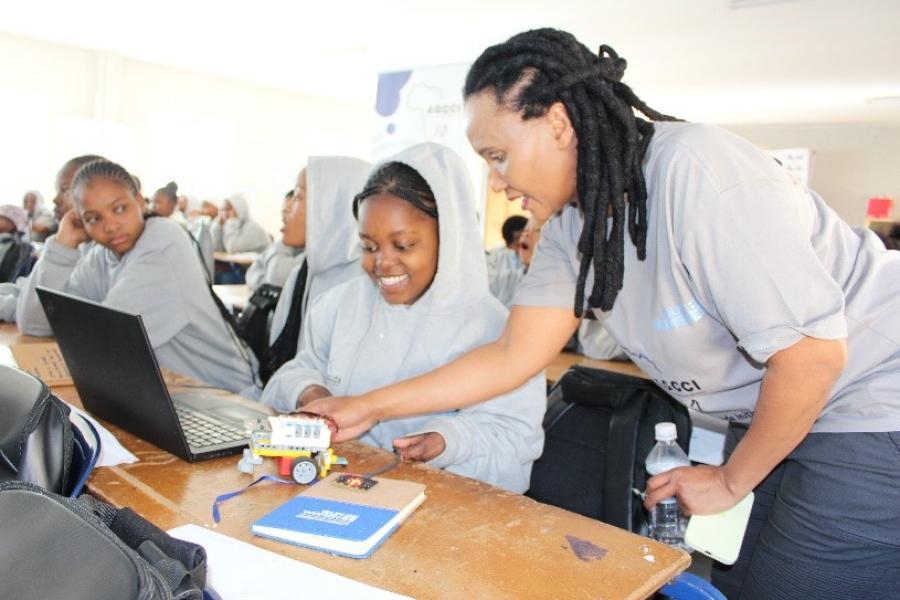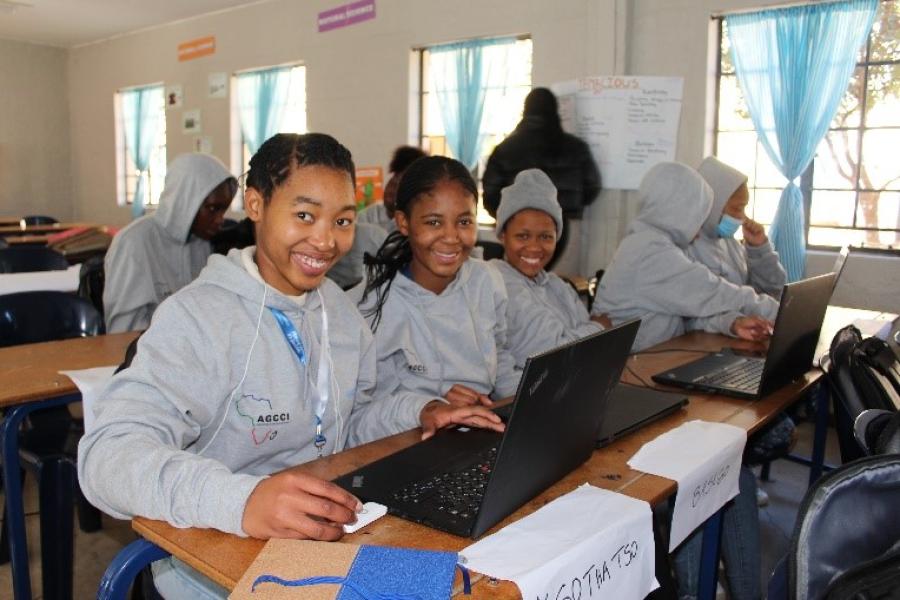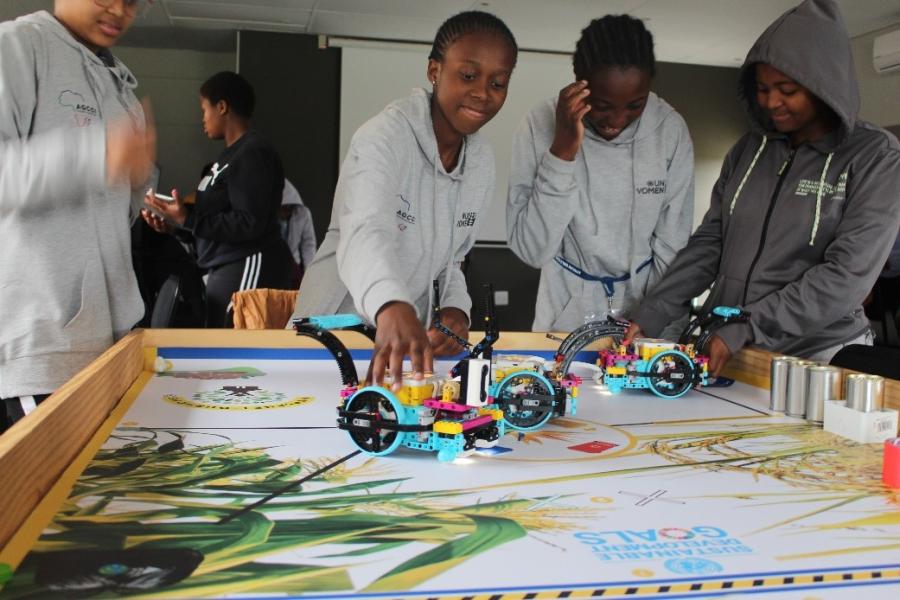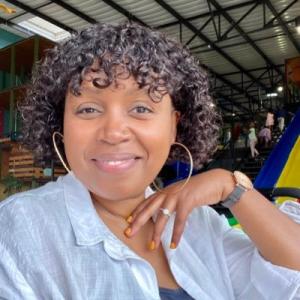African Girls Can Code Initiative back in South Africa to equip young women with STEM skills
19 June 2024

After successfully training two groups of high school girls in all nine provinces in South Africa in 2023, the African Girls Can Code Initiative (AGCCI) coding camp is back! This time, the programme will equip young women in TVET colleges with coding and robotics skills at a coding camp in Mamelodi, Pretoria on 24 June – 5 July 2024. AGCCI, implemented in South Africa by the United Nations Women's Agency (UN Women) South Africa Multi-Country Office in partnership with the Department of Higher Education and Training, and the Department of Science and Innovation (DSI), is supported by Siemens and the Belgian government.
According to the UN Women Gender Snapshot 2023, women held only one in five science, technology, engineering and math (STEM) jobs in 2020. Additionally, women are two times less likely than men to know a computer programming language, based on data from 62 countries, and hold less than 25% of Science, Engineering and ICT jobs globally. Their lack of representation in the burgeoning AI industry has already negatively affected the technology's ability to adequately address women's needs and support them.
To contribute to the solution on the African continent, UN Women, and the African Union Commission (AUC), in collaboration with the International Telecommunication Union (ITU), commissioned the program in 2018. AGCCI has two main components: coding camps and mainstreaming ICT, coding, and gender into the national school curricula.
"We’re thrilled to once again have AGCCI in South Africa, with special focus this time on young women at tertiary institutions. As convener of the Generation Equality Action Coalition on Technology and Innovation, UN Women consistently calls for the inclusion of women and girls in tech. AGCCI translates this into action by providing technical and leadership training, and fostering career development for young women. The program directly tackles gender stereotypes and societal biases, encouraging more girls to pursue STEM careers,” said Aleta Miller, Representative of UN Women in the South Africa Multi-Country Office.
The coding camp for TVET students in Mamelodi will focus on robotics, artificial intelligence, 3D printing and micro science. A selected group of young women from Mamelodi TVET college will participate in the programme. The South African cohort is part of a larger group of girls on the continent who have received similar training in Kenya, Rwanda, Uganda, Tanzania, Mozambique, Burundi, Mali, Niger, DRC, and Senegal.
“The Department of Higher Education and Training is excited to participate in this important initiative which will bring positive change in the lives of young women and encourage them to take up STEM courses. The department, through its Career Development Services, has been encouraging young women to enrol for STEM courses, and provided funding for such, but the numbers have not been increasing as desired. Therefore, this initiative is a step in the right direction,” said Sesi Mahlobogoane, Director of Social Inclusion and Equity at the Department of Higher Education and Training.
The AGCCI program introduces students to computer science and next-generation technologies, user interface/user experience, website development, mobile applications development, robotics, and programming. The young participants also learn about gender equality and women's empowerment and what inclusion in the ICT sector will mean for progress and diversity.
“The DSI’s participation in the AGCCI contributes to the realization of government’s commitment to enable all children and adults to become digitally literate as outlined in the 2019 White Paper on Science, Technology and Innovation (STI). The initiative addresses the second societal grand challenge (SGC 2) on the futureproofing of skills and education set out in the DSI’s Decadal Plan by providing an opportunity to leverage STI for rapid and maximum positive impact on education and skills. The initiative also supports the government’s efforts to promote one of the aspirations of Agenda 2063: The Africa We Want - which calls for well-educated citizens and skills revolution underpinned by Science, Technology and Innovation,” said Sigfried Tivana, Assistant Director of Africa Multilateral Cooperation at the Department of Science and Innovation.
About African Girls Can Code Initiative
Launched in 2018, the African Girls Can Code Initiative was established to train and empower a minimum of 2000 girls aged 17 to 25 across Africa to become computer programmers, creators, and designers, putting them on the right track to undertake studies and pursue careers in the information, communication, and technology (ICT) sectors. The program launched in December 2019 and yielded good results. A second phase was launched in April 2022, funded by the government of Belgium and Siemens, to ensure African girls benefit and contribute to the technological revolution in their countries and the continent.
About UN Women
UN Women is the global champion for gender equality, working to develop and uphold standards and create an environment in which every woman and girl can exercise her human rights and live up to her full potential. We are trusted partners for advocates and decision-makers from all walks of life and a leader in the effort to achieve gender equality. To learn more about UN Women’s work on the African continent: https://africa.unwomen.org/en.
To attend the opening in Mamelodi or for media interviews please contact:
Maphuti Mahlaba
Communications Analyst – UN Women South Africa Multi-Country Office
maphuti.mahlaba@unwomen.org
+27 65 742 4459
Photos
Below (and attached in the email in high-res) are some pictures from the African Girls Can Code Initiative South Africa coding camps in 2023 . The young women were exposed to coding and robotics skills over 10 days. The sessions also allowed the girls to hone their soft skills and grow in self-confidence. The young women were also able to connect and build relationships across the provinces.
Photos: UN Women South Africa Multi-Country Office









